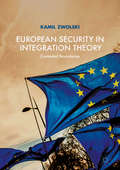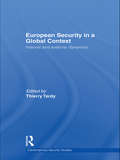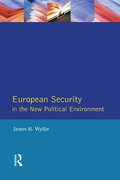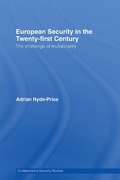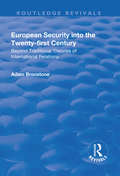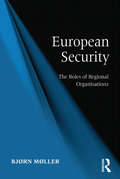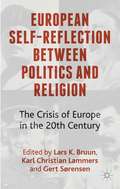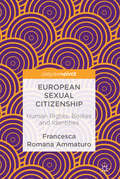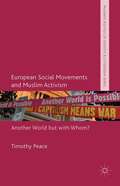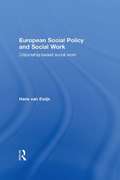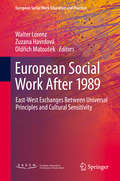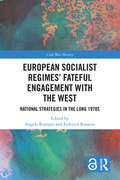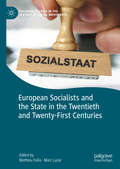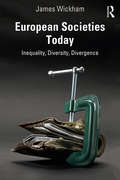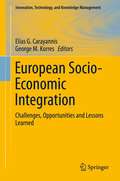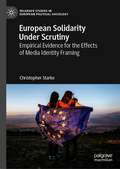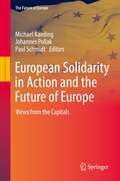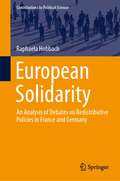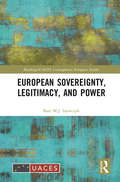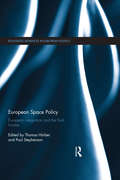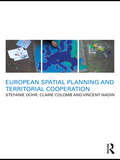- Table View
- List View
European Security in Integration Theory: Contested Boundaries
by Kamil ZwolskiThis book examines federalism and functionalism – two fundamental, yet largely forgotten, theories of international integration. Following the recent outbreak of the war in Ukraine, policy practitioners and scholars have been in search of a deeper understanding of the likely causes of the conflict and its consequences for the European security architecture. Various theories have been deployed to this end, but international and European integration theory remains conspicuously absent. The author shows how the core tenets of integration theories developed after World War I, particularly how they viewed territoriality and geopolitical boundaries, remain as relevant today as they were almost 100 years ago.
European Security in NATO's Shadow
by Stephanie C. HofmannNATO has been a successful forum for managing European security policy. Yet European governments have repeatedly tried to build a new security institution in NATO's shadow. In this innovative book, Stephanie C. Hofmann asks why governments attempted to create an additional institution despite no obvious functional necessity and why some attempts failed while others succeeded. European Security in NATO's Shadow considers security cooperation through the lens of party ideologies to shed new light on these questions. She observes that political parties are motivated to propose new institutions by their multidimensional ideologies. Moreover, the success of efforts to create such institutions depends on the degree of ideological congruence among parties in power. In particular, the relationship between the values of multilateralism, sovereignty and Europe informed the impetus and success rate of the attempts made during negotiations for the Maastricht, Amsterdam and Nice treaties to create a European security institution.
European Security in a Global Context: Internal and External Dynamics (Contemporary Security Studies)
by Thierry TardyThis new edited volume examines contemporary European security from three different standpoints. It explores security dynamics, first, within Europe; second, the interaction patterns between Europe and other parts of the world (the United States, Africa, the Middle East, China and India); and, finally, the external perceptions of European security. The first part of the book analyses the European security landscape. The roles of EU, NATO and the OSCE are given particular attention, as is the impact of their evolution- or enlargement- on the European security architecture and European security dynamics. In this context, Russia’s repositioning as a major power appears as a shaping factor of contemporary European geopolitics. The second part presents European security from an external perspective and considers interactions between Europe and other states or regions. Security trends and actors in Europe are examined from an American, Chinese, and Indian perspective, while Europe--Africa and Europe--Middle East relations are also addressed. This book will be of great interest to students of European Security, European politics and IR in general.
European Security in the New Political Environment: An Analysis Of The Relationships Between National Interests, International Institutions And The Great Powers In Post Cold War European Security Arrangements
by James H. WyllieEuropean Security in the New Political Environment provides a thorough analysis of the detail and nature of post-Cold War security issues, from both traditional and new security agendas, assessing the current efficacy of current institutions and policies to address these issues.
European Security in the Twenty-First Century: The Challenge of Multipolarity (Contemporary Security Studies)
by Adrian Hyde-PriceCombining a sophisticated theoretical analysis with detailed empirical case-studies, this book provides an original view of the challenges and threats to a stable peace order in Europe. The end of Cold War bipolarity has transformed Europe. Using structural realist theory, Adrian Hyde-Price analyzes the new security agenda confronting Europe in the twenty-first century. Europe, he argues, is not ‘primed for peace’ as mainstream thinking suggests, rather, it faces new security threats and the challenge of multipolarity. This critical and original volume looks at European security after the Iraq War, the failure of the EU constitution and the change of government in Germany. Reflecting on the inherently competitive and tragic nature of international politics, it concludes that realism provides the only firm foundations for an ethical foreign and security policy. European Security in the Twenty-First Century will appeal to students and scholars of international relations, European politics and security studies.
European Security into the Twenty-First Century: Beyond Traditional Theories of International Relations (Routledge Revivals)
by Adam BronstoneThis title was first published in 2000: Both NATO and the European Union are in the early stages of enlargement processes that will see both organizations expand to include a number of former Communist countries from Central Europe. Simultaneously, these processes ignore and exclude the interests and concerns of Russia and Turkey, respectively in the name of European security. Are both of these processes condemned to fail because of what was left out, rather than put in, to the organizational mix of both alliances? Is the leadership of NATO, for example, making the single largest, and costliest, blunder in the history of the organization? And is this being done, as well as that by the European Union, in part because of narrowly-held theoretical perspectives that define security in the most minimalist terms? Too often these processes of enlargement are discussed both out of context and in seclusion from one another, as if neither affects the other in any way, shape or form. This work brings together both processes of enlargement in order to examine whether or not similar mistakes are being made by both organizations, with grave practical consequences. This work will also examine both processes of enlargement from a critical perspective in that it will challenge the theoretically-driven conventional wisdoms of both processes. By doing so, this work will illustrate the need to go beyond these theories of International Relations and advocate the use of a number of non-traditional and very alternative positions that will assist one in developing richer, more comprehensive and inclusive explanations and understandings of these processes, as well as the field of International Relations in general. This work seeks to challenge the current state of International Relations, broadly defined, on its own ground in the hopes of presenting and developing, something newer and exciting for tomorrow.
European Security since the Fall of the Berlin Wall
by Martial Foucault Frederic Merand Bastien IrondelleThere have been dramatic changes to the landscape of European security in the twenty years since the fall of the Berlin Wall. The essays in European Security Since the Fall of the Berlin Wall collectively take stock of how approaches to security in Europe have changed, both in practice and in theory, since the end of the Cold War.Organized into three sections, this collection begins with an exploration of the broad changes in Europe's security environment relating to issues such as terrorism and the rising importance of energy security. The second section describes the adaptations of Europe's institutional framework, including the transformation of NATO and the evolution of European armed forces, while the closing essays examine regional security issues with the Middle East, the Balkans, and Russia. Covering a broad spectrum of theoretical approaches and written in a clear, engaging style, European Security Since the Fall of the Berlin Wall will illuminate European security debates for years to come.
European Security, Terrorism and Intelligence
by Christian Kaunert Sarah L�onardThe new security challenges that have arisen as a result of the rise in prominence of global terrorism have presented the European Union with a unique opportunity to rebrand itself as dominant force on the international stage. Traditionally viewed as a weak actor, it efforts to promote intelligence-sharing and by instituting wide-ranging cooperation between national police forces have ensured that the EU is well-placed to combat the challenges posed by global terrorism and have given it renewed vigour as an international actor. Through contributions from experts on the EU and global security, this book discusses the measures taken by the European Union to counter terrorism at a both national and global level as well as drawing wider conclusions on the nature and success of the confederation as an international security actor focusing specifically on JHA policy. This volume provides an original and much needed contribution to the literature on EU security governance at the global level.
European Security: The Roles of Regional Organisations
by Bjørn MøllerEurope has undergone quite profound changes since the end of the Cold War. Having been a highly militarised, conflict-ridden and war-ridden region, the core of Europe today constitutes a security community where armed conflicts among the constituent states has become inconceivable. This comprehensive book offers a theoretically founded and thoroughly documented analysis of European security, with a special emphasis on the role played by the United Nations and the various regional and sub-regional organisations, especially the North Atlantic Treaty Organisation, the Organisation for Security and Cooperation in Europe, the Council of Europe and the European Union. When it comes to explaining peace in Europe opinions differ widely. Some argue that it was only because the West refused to give in to Soviet threats that the latter eventually gave up; or that the 'long peace' in Europe was due to the combination of a bipolar alliance structure, pitting the North Atlantic Treaty Organisation (NATO) against the Warsaw Pact, with the presence of nuclear weapons on both sides. Others point instead to the extraordinarily dense network of international institutions and organisations in Europe, offering a wide panoply of fora in which to handle disputes peacefully; or to the web of interdependence in economic and other affairs, tying together all states in Europe in relations which militate strongly against war. Still others believe that the external peace between the states in Europe is simply a reflection of a convergence of cultures, democracies with marked economies that are open towards the world market. These questions are the focal point of this book, which concentrates on security, albeit not in the sense of being a treatise on military matters, but security obtainable by much more indirect and non-military means. It will be required reading for all students and scholars of European security and the organisations which underpin it.
European Self-Reflection between Politics and Religion
by Lars K. Bruun Karl Christian Lammers Gert S�rensenThis collection of essays suggests new ways of looking at the intertwining of political and religious agonies in the period 1914-1991. The long 'European civil war' revealed that Europe, far from being formed by a one-track progression, has followed several tracks or fault lines, leading to a number of contrasts in European self-perception.
European Sexual Citizenship
by Francesca Romana AmmaturoThis book is an innovative and critical contribution to the study of the human rights of lesbian, gay, bisexual, transgender, intersex and queer (LGBTIQ) people in the context of Europe. Combining legal and Foucauldian approaches, it investigates the ways in which current discourses about LGBTIQ rights in Europe are tightly bound to contemporary debates about national and trans-national citizenship. The author defines and analyzes the concept of 'multisexual citizenship' to illustrate new, flexible forms of sexual and gendered citizenship that could radically transform practices of citizenship and the current human rights framework in Europe. She does this by combining critical deconstructions of the case law of the European Court of Human Rights with ethnographic observations and sociological analysis. This interdisciplinary work will appeal to sociologists, lawyers and researchers of gender and LGBTIQ rights.
European Sexual Citizenship: Human Rights, Bodies and Identities
by Francesca Romana AmmaturoThis book is an innovative and critical contribution to the study of the human rights of lesbian, gay, bisexual, transgender, intersex and queer (LGBTIQ) people in the context of Europe. Combining legal and Foucauldian approaches, it investigates the ways in which current discourses about LGBTIQ rights in Europe are tightly bound to contemporary debates about national and trans-national citizenship. The author defines and analyzes the concept of 'multisexual citizenship' to illustrate new, flexible forms of sexual and gendered citizenship that could radically transform practices of citizenship and the current human rights framework in Europe. She does this by combining critical deconstructions of the case law of the European Court of Human Rights with ethnographic observations and sociological analysis. This interdisciplinary work will appeal to sociologists, lawyers and researchers of gender and LGBTIQ rights.
European Social Movements and Muslim Activism
by Timothy PeaceHow do progressive social movements deal with religious pluralism? In this book, Timothy Peace uses the example of the alter-globalisation movement to explain why social movement leaders in Britain and France reacted so differently to the emergence of Muslim activism.
European Social Policy and Social Work: Citizenship-Based Social Work
by Hans van EwijkEuropean Social Policy and Social Work explores shifts in international social policies and how they affect national trends and thus the context for social work practice. The book discusses international and national social work strategies and practice and investigates the responsibilities for social welfare held by the state, the market and civil society. Hans van Ewijk then elaborates a new concept of citizenship-based social work which supports and encourages self-responsibility, social responsibility and the implementation of social rights. The main themes covered are: international social policy and social work from welfare to workfare citizenship essentials of citizenship based social work community policy and community work social work and alternative areas of activity such as youth care and social care. Integrating different roots and social professions in an overarching new concept, this book particularly looks at European Union countries. Hans van Ewijk examines debates regarding social work as an internationally recognised profession and science. This book is suitable for social work students, academics and professionals with an interest in social policy and international social work.
European Social Work After 1989: East-West Exchanges Between Universal Principles and Cultural Sensitivity (European Social Work Education and Practice)
by Walter Lorenz Zuzana Havrdová Oldřich MatoušekThis book presents a unique analysis of the learning derived from East-West contacts in social work and reflects on the discipline's inalienable trans-national dimensions, of high actuality in the face of the re-emergence of nationalisms. The fundamental transformations in Europe subsequent to the revolutions of 1989 had a profound impact on social work in terms of raising sharply the profession’s relationship with politics. The exchanges between western schools of social work and the emergent academic partner institutions in former Communist countries formed a valuable testing ground for the essential principles and competences of social work in terms of their universal scientific basis on the one hand and their regard for cultural and national values and contexts on the other. The chapters in this contributed volume focus on lessons derived from fundamental social and political transformations, highlighted by East-West encounters and intra-national divisions, and thereby have important messages for mastering impending transformations in the light of the global COVID-19 health crisis. They demonstrate how cultural and social divisions can be addressed constructively with direct implications for training and practice in dramatically changing contexts:Lithuanian social work’s claim to professional autonomy vs. authoritarianism in popular and political culture Social work between civil society and the state – lessons for and from Hungary in a European contextWhen Europe’s East, West, North and South meet: learning from cross-country collaboration in creating an international social work master programmeNordic-Baltic cooperation in social work researcher education: A Finnish perspective on the impact on scientific, historical and linguistic similarities and differencesIntra-national similarities and differences in social work and their significance for developing European dimensions of research and educationSocial work, political conflict and European society: reflections from Northern Ireland European Social Work After 1989: East-West Exchanges Between Universal Principles and Cultural Sensitivity is an invaluable resource for social work educators; social work practitioners confronted with national and international divisions; students of social work, of social administration and policy; and any policy researcher with a comparative focus.
European Socialist Regimes' Fateful Engagement with the West: National Strategies in the Long 1970s (Cold War History)
by Angela Romano; Federico RomeroThis edited volume analyses European socialist countries’ strategy of engagement with the West and the European Economic Community in the long 1970s. The book focuses on a time when the socialist regimes of Central and Eastern Europe banked their hopes for prosperity and stability on enhanced relations with the West. Crossing the traditional differences among diverse fields of historiography, it assesses the complex influence of European and global processes of transformation on the socialist elites’ reading of the international political and economic environment and their consequent decision-making. The volume also explores the debate in each country among and within the elites involved in policymaking as they elaborated this strategic view and coped with shortcomings and unexpected turns. A comparative analysis of national cases shows a shared logic and common patterns, together with national variations and a plurality of views on the desirability of exchanges with their capitalist neighbours and on the ways to promote them. The multinational coverage of seven countries makes this volume a starting point for anyone interested in each socialist state’s foreign policy, intra-bloc relations, economic strategy, transformation and collapse, relations with the European Community and access to the EU. This book will be of much interest to students and researchers of Cold War Studies, European history, and International Relations.
European Socialists and the State in the Twentieth and Twenty-First Centuries (Palgrave Studies in the History of Social Movements)
by Mathieu Fulla Marc LazarThis edited volume promotes a comparative and transnational approach to the complex and ambiguous relationship between West European socialism and the contemporary state over the longue durée. It encourages a better understanding of socialism while also casting an original light on the history of the contemporary state in Europe. Socialists have been a prime political force since the late nineteenth century through to the present. Through their strength, their presence at the heart of societies, their dynamism, inventiveness, and influence, they have left their mark on the European physiognomy and helped to forge part of its identity. This is particularly true where the welfare state is concerned, and the role played by the state in constructing, embedding, and extending this social model. Surprisingly, there has been no research aiming to systematically analyse the relationship between socialism and the state. This volume fills a gap in knowledge by rejecting the media simplification and political polemic maintained by opponents of socialism – and sometimes by socialists themselves – which systematically links socialism with “statism”. It focuses on numerous case studies involving France, Italy, Spain, Greece, Austria, Germany, Belgium, the United Kingdom and Scandinavia, and highlights the diversity of organisations within European socialism. Ultimately, this book demonstrates that the fate of this political culture depends on the socialist parties themselves but also on any new configurations that states may assume. Conversely, the future of states will also depend partly on the choices made by socialists, if they still exist and still have the means to shape decisions and make their voices heard.
European Societies Today: Inequality, Diversity, Divergence
by James WickhamThis accessible new text introduces students to contemporary European societies by examining structures of inequality, making sense of the empirical and historical contexts. Focusing on seven differing European societies (France, Germany, Ireland, Italy, Poland, Sweden and the UK), it examines the different ways in which sociology and political economy understand the social structure of contemporary Europe. Separate chapters outline key aspects of inequality, beginning with income, wealth and poverty, followed by occupation and social class, gender, regional inequality, ethnicity, and migration. By focusing on the role of the national welfare states of Europe in restraining economic inequality, the book enables a realistic appraisal of the ‘European Social Model’. Key features: Examines European ‘distinctiveness’ and difference; Visual presentation of data accessibly informs the reader about distinctive features of specific societies; Comparative approach extends to evaluate the extent to which Europe differs from the USA; Illustrates how the UK’s half-hearted relationship to ‘Europe’ is not just a matter of history or politics but also of contemporary social structure; Key in-text features include discussion topics and key readings. This textbook will be essential reading for students of European studies, European politics, European societies, social inequality/structure, European welfare and policy and more broadly to sociology and public policy and administration.
European Socio-Economic Integration
by Elias G. Carayannis George M. KorresEconomic integration is one of the most noteworthy issues in international economic policy at the end of the twentieth century. The recent examples of the European Union (EU) and the North American Free Trade Association (NAFTA) have raised important questions about the economic integration process and the possible establishment of economic unions in other parts of the world. Against the backdrop of the financial crisis in Europe and prospects of increasing integration in Asia, this volume showcases research from an international array of researchers to provide a basic understanding of the current issues, problems, challenges, and opportunities for achieving integration, addressing both empirical and theoretical aspects of such topics as monetary union, social policy reform and social union, public finance and technology policy. The chapters in Part 1 are focused primarily on economic issues, while Part 2 covers on social policy, the welfare state, and political reforms, with a particular emphasis on the European Union. Among the questions addressed: What are the main determinants and implications for socio-economic integration?How can economic policy influence the growth and integration process?Why is innovation important for regional economic development?What has been the policy response so far and what lessons have we learned from it?And finally, what are our action lines for the future?
European Solidarity Under Scrutiny: Empirical Evidence for the Effects of Media Identity Framing (Palgrave Studies in European Political Sociology)
by Christopher StarkeThis book explores the processes through which European solidarity is constructed. More specifically, it investigates how the media's framing of European identity can facilitate and/or impede the emergence of European solidarity on the individual level. Through an online experiment that tested the effect of two different media identity frames on individual solidarity during the European debt crisis, the author argues that the exposure to news articles using a value-based identity frame boosts solidarity compared to an economic identity frame. This interdisciplinary work will be of interest to scholars of political sociology, political communication and political psychology, as well as any researchers who study European integration.
European Solidarity in Action and the Future of Europe: Views from the Capitals (The Future of Europe)
by Michael Kaeding Paul Schmidt Johannes PollakThis book sheds light on how member states and EU neighbours reacted to the COVID-19 pandemic through the lens of European solidarity, what they expect from the EU, and other member states, and how they are ready to contribute to common action. The volume reveals how European countries experience and perceive solidarity from the EU and towards the EU in different policy dimensions, such as intra-EU mobility, healthcare and financial and economic aspects of Europe’s recovery. The book offers national perspectives and perceptions of solidarity and concrete aspects in different policy areas. It includes a Foreword by the Vice-presidents of the European Parliament Katarina Barley and Othmar Karas.
European Solidarity: An Analysis of Debates on Redistributive Policies in France and Germany (Contributions to Political Science)
by Raphaela HobbachThis book addresses the central question of European solidarity in the face of a multitude of crises in Europe and focuses on its discursive manifestation in public debates. It is the first to systematically examine national debates on redistributive policies in the EU and the role of European solidarity within them by analysing French and German parliamentary debates on redistributive EU policies during the euro crisis and the migration crisis. By doing so, the book addresses the question of how relevant the idea of European solidarity is when redistributive policies in the EU are discussed at the national level and examines the conditions under which it is ascribed more or less relevance. Moreover, the book reveals that what European solidarity actually means in practice is often highly contested.
European Sovereignty, Legitimacy, and Power (Routledge/UACES Contemporary European Studies)
by Bart M.J. SzewczykThis book shows how the EU’s dual sovereignty–legitimacy problem can be resolved through the political concept of European citizenship, which can serve both to define the scope of European sovereignty and to justify EU power beyond national democracy. It reconceptualizes the EU’s legitimacy problem and demonstrates how sources of legitimacy can be identified and give rise to European sovereignty. It argues that sovereignty should be based on the will of citizens acting through various political bodies within the EU—city halls, regional entities, national governments, and EU institutions—and develops a general theory, arguably applicable to any political order. The EU is an unprecedented political project that is in tension with traditional forms of state legitimation based on national democracy, as nationalists and populists throughout Europe often make clear. Against this backdrop, the book fully articulates the notion of European sovereignty and argues that the EU’s sources of legitimacy are based on European citizenship and national democracy. This book will be of key interest to scholars and students of EU politics, European integration, international institutions, and international relations.
European Space Policy: European integration and the final frontier (Routledge Advances in European Politics)
by Paul Stephenson Thomas HörberSpace policy is at the cutting edge of current EU policy developments and is a fascinating object of study, involving multiple and diverse actors. It is also an original and contemporary lens for studying European policy-making. This book explores advances in European space policy and their significance for European integration. Using a ‘framing’ methodology, it addresses central questions in European studies in order to form an interdisciplinary bridge between current research in space policy and contemporary European political studies. It assesses the interests of EU institutions in space and how these institutions perceive space policy. Furthermore, it demonstrates that space is a cross-cutting policy domain affecting a diverse range of EU policy fields, such as security, transport and migration, and underpinning the 21st century European and global economy. In doing so, this volume firmly locates space policy in the field of European Studies. This innovative volume will be of key interest to students and scholars of a range of policy areas including common foreign and security policy, technology policy, transport policy, internal market policies, environmental policy, development aid and disaster-risk management, as well as the EU institutions.
European Spatial Planning and Territorial Cooperation
by Vincent Nadin Stefanie Dühr Claire ColombThere is a strong international dimension to spatial planning. European integration strengthens interconnections, development and decision-making across national and regional borders. EU policies in areas such as environment, transport, agriculture or regional policy have far-reaching effects on spatial development patterns and planning procedures. Planners in the EU are now routinely engaged in cooperation across national borders to share and devise effective ways of intervening in the way our cities, towns and rural areas develop. In short, the EU has become an important framework for planning practice, research and teaching. Spatial planning in Europe is being ‘Europeanized’, with corresponding changes for the role of planners. Written for students, academics, practitioners and researchers of spatial planning and related disciplines, this book is essential reading for everybody interested in engaging with the European dimension of spatial planning and territorial governance. It explores: spatial development trends and their influence on planning the nature, institutions and actors of the European Union from a planning perspective the history of spatial planning at the transnational scale the planning tools, perspectives, visions and programmes supporting European cooperation on spatial planning the territorial impacts of the Community’s sector policies the outcomes of European spatial planning in practice.
